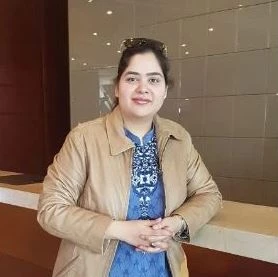‘One truth remains constant: women and children bear the brunt of every disaster, whether natural or man-made’

Dr Lubna Zaheer
As we sit safely within the comfort of our homes, surrounded by our loved ones and shielded from crisis, it's easy to overlook the unimaginable hardships others face just miles away—or across borders. In flood-ravaged regions of Pakistan and the war-torn streets of Gaza, life has come to a devastating halt. Homes lie in ruins, families are torn apart, and survival has become the only goal. But amid this shared suffering, one truth remains constant: women and children bear the brunt of every disaster, whether natural or man-made. Their unique vulnerabilities demand more than sympathy—they require urgent, focused action. This article sheds light on their silent struggles, the systemic gaps in relief, and the moral responsibility that rests on all of us to not just witness—but respond.
We are fortunate. Safe in our homes, our children by our side, life continues as usual. We are not begging for help, nor waiting endlessly for aid. But for thousands struck by the floods, life has turned into a nightmare. Homes are gone. Crops are destroyed. Some have lost their children to the waters. Others are sick, weakened by hunger and harsh weather. Picture the farmer whose land once yielded gold. Today he sits in a government camp, waiting for a ration bag. For many, the floods have brought a lifetime of loss. Gaza tells a similar story, rather worse. Months of bombardment have reduced homes to rubble. Families are shattered. Aid is blocked. In disasters, whether natural or man-made, civilians suffer most. Yet women and children remain the softest targets. Their needs are always different, and always greater.
In Punjab, flood-hit families are in despair. Men, women and children all struggle, but women face the hardest ordeal. For instance, a man can spend nights under the open sky. For women, it is not so simple. Relief camps are overcrowded, yet many women still feel unsafe. Some sleep outside, exposed and vulnerable. Reports of theft and harassment add to their misery. The world has seen this before in the times of various calamities. After the 2005 earthquake, abductions and harassment of women were reported. The lesson is clear: alongside food and medicine, their protection must be a priority. Moreover, pregnant women and mothers of infants need urgent attention. Imagine a woman giving birth in the open, or a mother nursing her baby without food. When a mother goes hungry, the child inevitably suffers from malnutrition. Even basic sanitary needs of women are ignored in these crises. Research shows human beings especially, children who survive disasters live under trauma for years. The images from recent floods speak for themselves: children lying un-clothed, separated from mothers, carried through waters in pots or on shoulders. These are heartbreaking scenes—Allah alone protects them.
In Gaza, the plight is even more horrific. Hundreds of children have been killed, many left disabled for life. Others have become orphans. International agencies warn of widespread malnutrition. Women are miscarrying due to stress. With medicines in short supply, even surgeries are performed without anesthesia. Lacking sanitary products, women are forced to use paper or plastic scraps. Yet the world remains silent. Israel flouts every principle of war. Who will stop its hand? When will Palestinians be free of this cruelty?
Back home, efforts are underway. Maryam Nawaz in Punjab, Murad Ali Shah in Sindh, and Ali Amin Gandapur in Khyber Pakhtunkhwa are active. NGOs are present in flood-hit regions. Much of the media is playing a positive role, highlighting the victims’ voices and keeping pressure on the government. But some media outlets remain fixated on political pictures and logos on aid boxes. Also some social media voices reduce the crisis to petty criticism. This helps no one. Let’s agree that excessive propaganda loses impact. Likewise, Blind, bitter criticism carries no weight. Neither the public nor the government takes it seriously. The real focus must remain where it belong i.e. on the victims, especially women and children—who continue to pay the highest price.

-- The writer is a professor and analyst specializing in media and communication studies. She can be reached at lubna.zaheer91@gmail.com
Disclaimer: The views expressed in this article are those of the author and do not necessarily reflect the official policy or position of www.gnnhd.tv
Global oil and gas shipping costs surge as Iran vows to close Strait of Hormuz
- ایک دن قبل
Iran Guards say launched more than 40 missiles at US, Israeli targets
- 10 گھنٹے قبل

Jeffrey Epstein saw promise in Bitcoin — and its far-right supporters
- 12 گھنٹے قبل

The Galaxy S26 is a photography nightmare
- 12 گھنٹے قبل

The Supreme Court appears likely to let stoners own guns
- 19 گھنٹے قبل

PM takes parliamentary leaders into confidence regarding Pak-Afghan situation
- 10 گھنٹے قبل
Apple launches new generation of MacBook laptops starting at $1,099
- ایک دن قبل
Iran postpones state funeral for Khamenei: state TV
- 7 گھنٹے قبل
Iran war enters fourth day in 'smoke and blood' as markets slide
- ایک دن قبل

What does “America First” even mean anymore?
- ایک دن قبل
New Zealand beat South Africa to reach T20 World Cup final
- 4 گھنٹے قبل

Do you need to know who you’d be without antidepressants?
- 19 گھنٹے قبل








